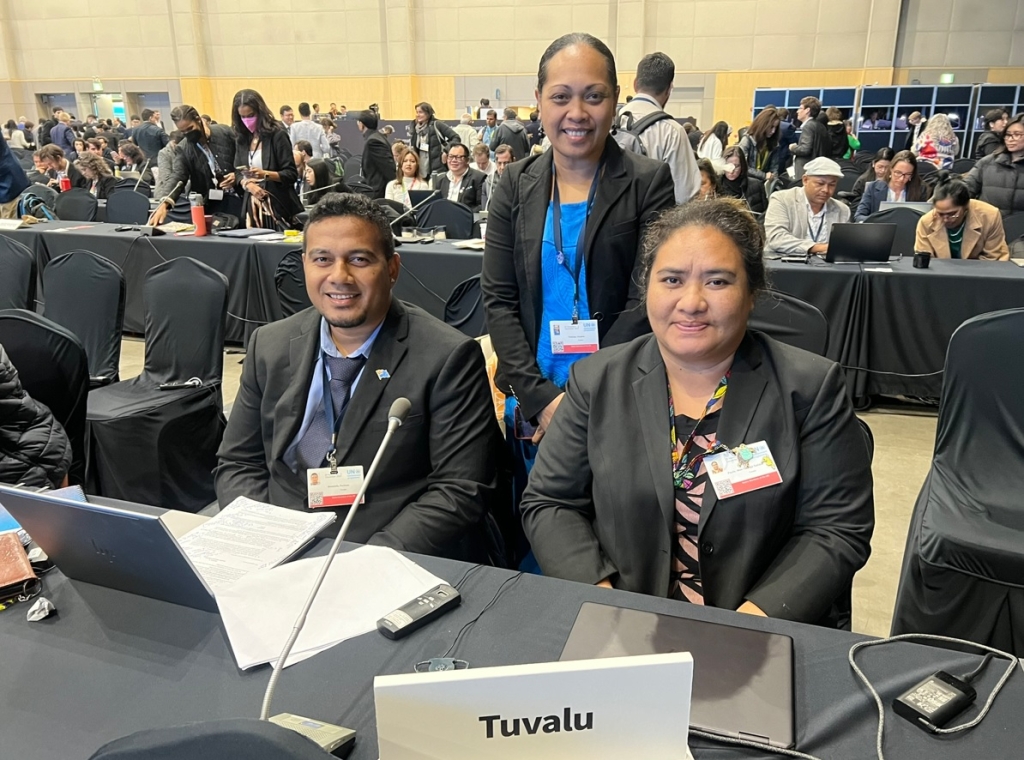
Pacific Islands have called for legally binding obligations in the global plastics treaty to address the entire lifecycle of plastics, including the remediation of legacy pollution, particularly in the marine environment.
The point was raised by Tuvalu on behalf of Pacific Small Island Developing States (PSIDS) during contact group discussions at the fifth session of the Intergovernmental Negotiating Committee to develop an international legally binding instrument on plastic pollution, including in the marine environment (INC-5), held at the Busan Exhibition and Convention Center (BEXCO), from 23 November to 1 December in the Republic of Korea.
Over 171 trillion pieces of plastic are estimated to be floating in the world’s oceans, the figure is projected to nearly triple by 2040 without urgent action.
Speaking on behalf of Pacific Small Island Developing States (PSIDS), Penivao Moealofa of Tuvalu emphasised the need for clear blinding obligations to hold countries accountable for remediation of existing plastic pollution, including in Areas Beyond National Jurisdiction (ABNJ).
“Remediating existing plastic pollution must be one of the core obligations of this treaty. Relatively soft commitments to simply cooperate are insufficient. As recipients of plastic waste in our large Pacific Ocean, we would like to see a clear reference to the marine environment including ABNJ, and not separate, as it is in the proposed text,” he said.
He also highlighted the need to safeguard SIDS from disproportionate burdens in addressing the problem they did not create.
“Small Island States are already disproportionately impacted by transboundary plastic pollution. It is essential that remediation activities do not further burden us, therefore references to remediation measures in this article must be coupled with means of implementation in other articles,” Mr Moealofa said.
“We support the chair’s proposed text on the special circumstances of SIDS but would like to make it clear that the special circumstances of SIDS are well defined and recognised in other international agreement, and should be different from the special circumstances of other groups, therefore prioritisation and special consideration should be given to the most affected party”.

Huge accumulations of floating legacy plastics, such as the Great Pacific Garbage Patch, the largest accumulation of floating plastic on Earth, lie in international waters, beyond national jurisdiction. This means no country currently has the responsibility to clean it up.
The Pacific is home to both the North and South plastic gyros, and fighting plastic on two fronts: domestic terrestrial waste, and foreign marine plastic pollution.
“As SIDS, it is already a challenge to manage our own plastic waste, and it is an injustice to us to continue to manage others’ plastic waste, especially when we contribute to less than 1.3% of the total global plastic waste,” Mr Moealofa added.
Pacific SIDS positions are in tandem with the larger grouping of the Alliance of Small Island States (AOSIS), who like the Pacific, have called for bilateral and multilateral cooperation among the parties inclusive of financial resources and transfer of relevant technologies to address remediation.
The fifth Intergovernmental Negotiating Committee to develop an international legally binding instrument on plastic pollution, including in the marine environment is taking place in Busan, Republic of Korea, from 25 November to 1 December 2024.
The Pacific Islands are represented by the Cook Islands, Federated States of Micronesia, Fiji, Kiribati, Marshall Islands, Nauru, Niue, Palau, Papua New Guinea, Samoa, Solomon Islands, Tonga, Tuvalu and Vanuatu through the support of the Government of Australia and the United Nations.
They are supported by the Secretariat of the Pacific Regional Environment Programme (SPREP), working with partners the Pacific Islands Forum Secretariat (PIFS), Office of the Pacific Ocean Commissioner (OPOC), The Pacific Community (SPC), Forum Fisheries Agency (FFA), Environmental Investigation Agency (EIA), Centre for International Environmental Law (CIEL), University of Wollongong, WWF and Massey University.
For more information, visit: https://www.unep.org/inc-plastic-pollution/session-5
Image by Pixabay